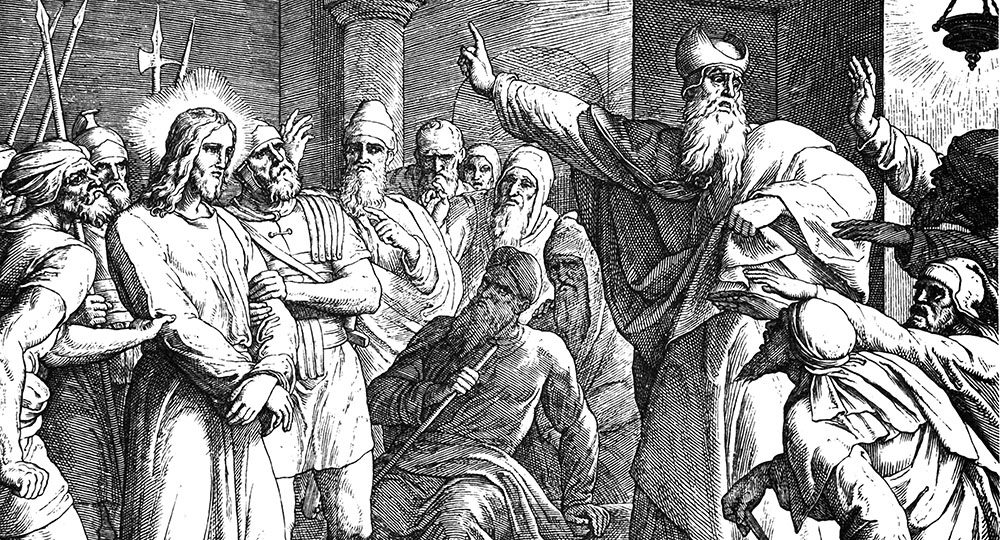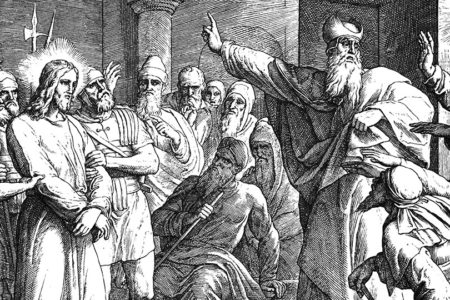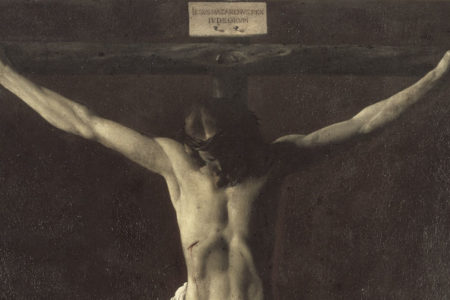Jesus Before Caiaphas
The Setting
When Jesus stood before Caiaphas, the high priest, at His so-called trial, it marked the climax of a battle between Him and the corrupt Jewish Temple leadership that had been escalating since Jesus began His ministry.
Essentially, the religious leaders were outraged that Jesus claimed authority to speak for God in a way that was equal to or even superior to their own authority (Mk. 11:27–33). Their antagonistic response to Jesus was both religiously and politically motivated. The Pharisees wanted to kill Jesus because He spoke as an authoritative interpreter of the law, assuming more authority than Moses (Mk. 1:22; 3:6). To them this was not only blasphemous, but it also threatened their authority. The Sadducees were afraid of Jesus because any type of messianic revival among the people would bring in the Roman legions, and the Sadducees would lose their position as the Jewish aristocracy under Roman rule. Both groups were jealous of Jesus because the people listened to Him as a true prophet of God (Mk. 15:10).
As Jesus stood before the Sanhedrin, He knew that they were not there to establish justice. In fact, according to Jewish law, the entire trial was illegal on several points. The Jewish leaders wanted to get Jesus out of the way as quickly and quietly as possible without starting a riot among the people. That is one of the reasons Jesus did not speak during the trial. He knew that any kind of defense on His part would be judged unfairly and that anything He said would be distorted and used against Him. After listening to witnesses contradict themselves in their attempts to implicate Jesus of some crime worthy of death and establish nothing, Caiaphas, out of frustration, personally took over the proceedings to try to bring the trial to its focal point—the claims of Jesus.
Caiaphas’ Question
Taking charge, Caiaphas asked Jesus directly if He was “the Christ [the Messiah], the Son of God” (Mt. 26:63). Before we interpret Jesus’ answer, we must first determine Caiaphas’ intention in asking this question. Obviously, he was trying to get Jesus to implicate Himself so that the Sanhedrin could convict Him of a crime—one they hoped would be worthy of death. Therefore, it seems apparent that in Caiaphas’ mind, Jesus’ admission that He thought He was the Messiah would be enough to convict Him of at least a charge against the Romans for instigating a rebellion.
While Caiaphas used the term Son of God in conjunction with Messiah, he was probably not thinking of the term Son of God as divine, as the Apostle John does in his writings. Rather, the Jewish concept of the Messiah was that He would be a fully human Davidic descendant who would be God’s Son by virtue of the Messiah’s close relationship to Him (Ps. 2:7; 89:19–29; cp. Peter’s confession in Mt. 16:16). In other words, Caiaphas was not asking if Jesus claimed to be God because that would be inconceivable to a rabbinically instructed Jew. Rather, he asked Jesus if He claimed to be the Messiah or if He was just another pretender. If Jesus had answered positively—Yes, I am the Messiah—He would have convicted Himself. If He answered negatively, he would have been judged a fraud and been discredited.
Jesus’ Answer
Jesus’ answer was in two parts. First, He answered Caiaphas’ question, and then He volunteered more information. While the initial answer was probably sufficient for the Sanhedrin to convict Jesus, His second statement certainly sealed His doom.
Jesus’ initial answer to Caiaphas has engendered much debate because of its different phrasing in each of the Gospels. Mark states that Jesus simply answered, “I am” (14:62). Matthew records Jesus as saying, “Thou [singular] hast said” (26:64), which is similar to Luke’s “Ye [plural] say that I am” (22:70). Some have inferred from Jesus’ less than direct statements recorded in Matthew and Luke that He never claimed to be the Messiah, but rather that other people, such as the disciples, claimed messiahship for Him. They interpret Jesus’ answer along these lines: You say I am the Messiah, not me.
It seems clear from all of the accounts that Jesus did not answer the question negatively, and He certainly understood the implications of His answer: condemnation or acquittal. It is also likely that Jesus, realizing the Sanhedrin’s unbelief (Lk. 22:67–68), was almost mocking Caiaphas. Interpreting His answer as an affirmation—especially in light of what He would say next—Jesus may have said something like, Yes, you have said it yourself, or Yes, it is as you say.
While Jesus’ first statement to Caiaphas may seem ambiguous, His second statement is not. Jesus used His present situation—a prisoner before the Sanhedrin—in contrast to His future position after His resurrection—seated at the right hand of God as Lord and judge. To do this Jesus combined two Old Testament passages, Psalm 110:1 and Daniel 7:13, and applied them to Himself.
In quoting Psalm 110:1, Jesus recalled His question to the crowd a few days before. He asked them How can the Messiah be the son of David, when David calls the Messiah his Lord? (author’s paraphrase) and then quoted Psalm 110:1 (see Mk. 12:35–37). While Jesus did not answer the question (nor did anyone else), the only answer that could be given is through the incarnation. David’s “Lord” is not only his son—in that the Messiah is a descendant of David—but the Messiah is also David’s Lord and judge, as described in Psalm 110. In other words, Jesus is not only the Son of David, but also the Son of God, in all of His divine fullness.
So, as Jesus stood before Caiaphas, He stated with certainty what His position would be, looking forward to His resurrection and ascension. He would be seated at the right hand of God as Lord and judge with all the authority of God (cp. Acts 2:34–36).
Jesus’ allusions to Himself as the “Son of Man” and “coming on the clouds of heaven” refers to Daniel 7:13. The scene in Daniel 7:9–14 is of God judging the world at the end time. The fascinating thing about this scene is that God, “the Ancient of days,” (7:9) gave this authority to judge to a “Son of Man” who “with the clouds of heaven…came.” When this Son of Man approached the Ancient of Days, Daniel saw that “there was given him dominion, and glory, and a kingdom, that all people, nations, and languages should serve him; his dominion is an everlasting dominion, which shall not pass away, and his kingdom that which shall not be destroyed” (7:14).
Jesus implied that this passage refers to Him as the Son of Man who has been given authority by God and will come in the future to judge all men.
In this way, both passages alluded to by Jesus picture a divine man—in Psalm 110, the Messiah, the Son of God; in Daniel 7, the Son of Man receiving authority from God the Father to judge all men. In essence, Jesus said to Caiaphas: You say that I am the Messiah. I am, but I am much more than that. I stand before you now and you judge Me unjustly. But the day will come when you will stand before Me, and I will judge you for your unbelief. I am the judge of the whole world, the Messiah, the Son of God, the Son of Man. This answer was much more than Caiaphas bargained for.
Caiaphas’ Response
Whether Caiaphas had a twinge of conviction in his heart is not stated. It doesn’t seem likely because his immediate response was to tear his clothes in horror at Jesus’ impudence and to charge Jesus with blasphemy. According to Leviticus 24:15–16, anyone who cursed God or blasphemed His name would be put to death. Technically, Jesus did neither of these things. He did however claim to be the Messiah, the Son of Man, who would rule at the right hand of God with the Father’s authority. Caiaphas not only considered it ludicrous that this Galilean preacher claimed such a thing, but he felt that Jesus had demeaned God’s majesty when He, as a mere man (or so he thought), usurped God’s authority in this way.
The remainder of the Sanhedrin agreed with Caiaphas’ judgment. They officially handed down a death sentence and then mocked Jesus, blindfolding Him, slapping Him, and asking, “Who smote thee?” (Mt. 26:68), for they assumed that the real Messiah would know. To them, Jesus was an object of scorn.
The Outcome
The Apostle John put a unique perspective on Caiaphas’ actions. In his Gospel he wrote that Caiaphas “prophesied” when he planned that “one man should die for the people” (Jn. 11:47–53). Caiaphas was thinking of political expediency. But John saw in Caiaphas’ statement the gospel of substitutionary atonement—Jesus died as the Lamb of God for the sins of Israel and the sins of the whole world. Thus, while Caiaphas and the Sanhedrin cannot be excused for their unbelief and perversion of justice, Jesus died on the cross because God the Father was offering His beloved Son as the perfect sacrifice that would enable all those who trust in Jesus to obtain eternal life.
Recently, a first-century tomb was discovered just south of the Old City of Jerusalem. Two ossuaries (bone boxes) in the tomb bear the name “Caiaphas” and inside are, apparently, his and his family’s bones. It may be that these are the remains of the same Caiaphas who interrogated Jesus and condemned Him to death (see Biblical Archaeology Review, Sept./Oct. 1992). If this is true, it proves Jesus’ answer to Caiaphas: “Thou hast said; nevertheless, I say unto you, Hereafter shall ye see the Son of man sitting on the right hand of power, and coming in the clouds of heaven” (Mt. 26:64).
At Pentecost, Peter reminded the nation that the Messiah, “the Holy One,” would not see corruption (Acts 2:27; see Ps. 16:10). The physical remains of both David and Caiaphas are with us today. But there is no tomb ossuary where we can go to find Jesus’ bones because Jesus—as the Messiah, the Son of God, the Son of Man—is seated at God’s right hand in heaven as Lord and judge of all the earth, just as He declared to Caiaphas.








Caiaphas was cruel. Like today’s man, unable to make a decision or protect what Jews believed in, manipulated by the world. His judgement was clouded by influence, like today’s youth, drinking alcohol and on drugs.